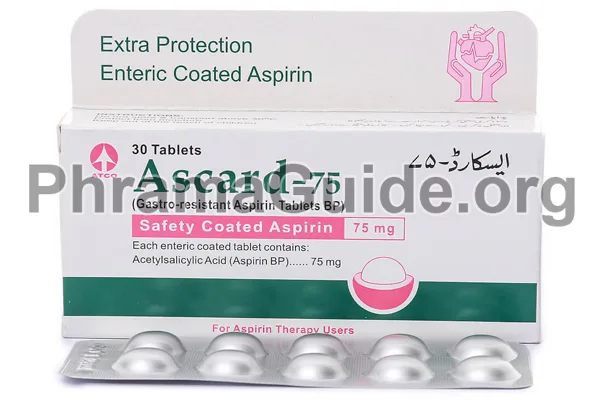Ascard is a widely used medication known for its pain-relieving, anti-inflammatory, and antiplatelet properties. While it is generally considered safe when used appropriately and as directed, Ascard can have side effects. It’s important to be aware of these potential side effects and to use Ascard under the guidance of a healthcare professional.
Common Side Effects Associated with Ascard
- Gastrointestinal Irritation: Ascard can irritate the stomach lining, which may lead to symptoms such as Heartburn, Stomach pain, Nausea, or even Stomach ulcers. Taking Ascard with food or an antacid can help reduce these effects.
- Gastrointestinal Bleeding: Prolonged or high-dose use of Ascard can increase the risk of gastrointestinal bleeding, which can manifest as Black, Tarry Stools, or Vomiting Blood. This is a serious side effect that should be reported to a healthcare provider immediately.
- Increased Bleeding Risk: Ascard is an antiplatelet agent, meaning it can reduce the ability of blood to clot. While this can be beneficial for preventing blood clots in some situations, it can also increase the risk of bleeding. This risk is especially relevant for individuals taking Ascard for its antiplatelet effects (e.g., to reduce the risk of Heart Attack or Stroke).
- Reye’s Syndrome (in Children and Adolescents): Ascard should not be given to children and adolescents with viral infections like the flu or chickenpox, as it has been associated with an increased risk of Reye’s syndrome, a rare but severe condition that affects the liver and brain.
- Allergic Reactions: Some individuals may experience allergic reactions to Ascard, which can include Hives, Rash, Swelling (especially of the face, lips, or tongue), and Difficulty Breathing. Seek medical attention immediately if you experience any of these symptoms.
- Tinnitus (Ringing in the Ears): Tinnitus, or a ringing or buzzing sound in the ears, is a less common side effect of Ascard use. It is more likely to occur at higher doses.
- Asthma Exacerbation: Ascard can trigger asthma symptoms or exacerbate asthma in some individuals. This is more common in people with a history of Ascard-exacerbated respiratory disease (AERD).
- Kidney Function Changes: Ascard can affect kidney function, particularly when used at high doses or for an extended period. It is important for individuals with kidney disease to use Ascard cautiously and under medical supervision.
- Liver Function Changes: Ascard can affect liver enzymes in some people. People with liver disease should use Ascard with caution and under medical guidance.
- Bleeding Disorders: Individuals with bleeding disorders or a history of bleeding problems should use Ascard with caution, as it can increase the risk of bleeding.

What is Ascard?
Ascard is one of the leading brands of Aspirin, manufactured and marketed by Atco laboratories, Pakistan.
Ascerd : Available Formulations and Strengths
Presently, Ascard is available in tablet form
Ascard Tablets : 75mg, 150mg, and 300mg strengths
What Are The Possible Drug Interactions of Ascard?
Anticoagulants (Blood Thinners): Combining Ascard with other anticoagulants like Warfarin or Heparin can increase the risk of bleeding. Your healthcare provider will carefully monitor your blood clotting time if you are prescribed both Ascard and anticoagulants.
Antiplatelet Agents: Taking Ascard with other antiplatelet medications, such as Clopidogrel (Plavix) or Prasugrel (Effient), can also increase the risk of bleeding. These medications are often prescribed together under close medical supervision for certain conditions, but the dosages may need adjustment.
Non-Steroidal Anti-Inflammatory Drugs (NSAIDs): Combining Ascard with other NSAIDs like Ibuprofen (Advil, Motrin) or Naproxen (Aleve) can increase the risk of gastrointestinal irritation, and bleeding, and may reduce the cardioprotective effects of Ascard. This combination should be avoided unless directed by a healthcare provider.
Selective Serotonin Reuptake Inhibitors (SSRIs) and Serotonin-Norepinephrine Reuptake Inhibitors (SNRIs): These are classes of antidepressants that may increase the risk of bleeding when taken with Ascard. Be cautious and inform your healthcare provider if you are on these medications.
Corticosteroids: Long-term use of Ascard along with corticosteroids, such as prednisone, can increase the risk of gastrointestinal bleeding.
Methotrexate: Ascard can increase the blood levels of methotrexate, a medication used for various conditions, including Rheumatoid arthritis and Cancer. This interaction can lead to an increased risk of methotrexate toxicity.
Certain Antihypertensive Medications: Some antihypertensive medications, like ACE inhibitors and angiotensin receptor blockers (ARBs), may have their effectiveness reduced when taken with Ascard. Discuss this potential interaction with your healthcare provider.
Medications for Gout: Probenecid, a medication used to treat gout, can reduce the effectiveness of Ascard by increasing its excretion from the body.
Diuretics (Water Pills): Some diuretics, particularly thiazide diuretics, may reduce the effectiveness of low-dose Ascard for preventing cardiovascular events. Your healthcare provider may need to adjust your treatment plan.
Acetazolamide: This medication, used to treat conditions like Glaucoma and Altitude sickness, may interact with Ascard and increase the risk of toxicity.
Ginkgo Biloba: The herbal supplement ginkgo biloba may increase the risk of bleeding when taken with Ascard. Be cautious when combining these two.
Herbal Supplements: Various herbal supplements, such as Garlic, Ginger, and Ginseng, can have blood-thinning properties. When taken with Ascard, they may increase the risk of bleeding.
Related Links :

Leave A Comment